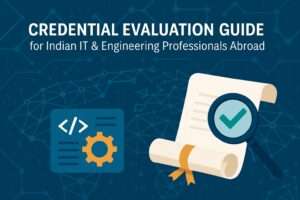
India produces a large number of IT and engineering graduates every year. With thousands of engineering colleges and polytechnic institutes, the country produces around a million engineers annually. Many of these professionals seek study or work opportunities abroad. To ensure their qualifications are recognized by foreign universities, employers, and licensing bodies, they must undergo a credential evaluation process.
Why Credential Evaluation Is Important
- University Admissions: Foreign institutions need to understand how your degree compares to their own system. An evaluation report translates your marks, credits, and course content into a familiar format.
- Employment Abroad: Companies rely on credential reports to verify that your degree meets local standards. This helps them make informed hiring decisions.
- Professional Licensing: Engineers often need to demonstrate that their degree is accredited by recognized bodies in their home country. Membership in international agreements, such as the Washington Accord, means that other member countries recognize accredited engineering degrees from India.
- Immigration: Many immigration systems award points for education only if a recognised agency has assessed it. A credential evaluation can boost your chances of obtaining a work visa or permanent residence.
- Fraud Prevention: Official evaluators verify the authenticity of your documents, reducing the risk of fake credentials.
Understanding India’s Education System
India’s higher education landscape is vast. Most engineering degrees fall into three main categories:
- Bachelor of Engineering (B.E.) / Bachelor of Technology (B.Tech): Four-year programs focusing on core engineering disciplines. These programs must be approved by the All India Council for Technical Education (AICTE) and are accredited by the National Board of Accreditation (NBA).
- Bachelor of Science (B.Sc.) in Computer Science or Information Technology: Three-year programs that provide a foundation in programming and algorithms. Some countries may require extra coursework for three-year degrees.
- Diploma and Postgraduate programs: Shorter diplomas from polytechnic institutes and postgraduate programs like M.Tech or MBA.
Key education bodies in India include the University Grants Commission (UGC), which oversees universities; AICTE, which approves technical programs; the National Assessment and Accreditation Council (NAAC), which rates institutions; and the NBA, which accredits engineering programs.
Step‑by‑Step Credential Evaluation Process
- Identify Your Purpose: Decide if you need a course-by-course evaluation for school, a general evaluation for employment, or an Educational Credential Assessment for immigration. Choose an agency accepted by your destination country, such as ACEI Global.
- Verify Accreditation: Ensure your degree is from a recognised university and that the AICTE approves your program. For engineering degrees, check that your program is NBA-accredited.
- Collect Documents:
- Degree certificate.
- Official transcripts detailing courses and grades, sent directly by your institution.
- Course descriptions or syllabi, if required.
- Proof of program accreditation, if available.
- Translation (If Needed): Most Indian degrees are in English. If any document is in a regional language, get a certified translation and submit it with the original.
- Notarize and Authenticate:
- Have copies notarised.
- Get state-level authentication from the education or human resources department.
- Obtain an Apostille or attestation from the Ministry of External Affairs, usually through outsourced agencies.
- Submit to the Evaluation Agency: Create an online account, pay the fee, receive a reference number, and send your documents. Your institution may need to mail sealed transcripts or use an approved digital service.
- Track and Receive Your Report: Processing can take a few weeks. You’ll receive a report showing how your degree compares to local credentials. Order extra copies for multiple applications.
Special Considerations for IT Degrees
Three-year IT programs, such as B.Sc. Computer Science may be treated as less than a full four-year bachelor’s degree in some countries. You might need to complete bridging courses before starting a master’s program. Highlighting professional certifications and work experience can also strengthen your applications.
Common Challenges and Tips
- Delayed Transcripts: Universities can take time to issue official transcripts. Request them early.
- Name Discrepancies: Ensure your name is consistent across all documents.
- Unaccredited Institutions: Degrees from unapproved colleges may not be accepted. Check before you enrol.
- Incomplete Attestation: Apostille or MEA attestation is often required. Don’t skip this step.
- Outdated Syllabi: For older degrees, request course descriptions from your institution.
Tips:
- Begin the evaluation process at least six months before your application deadline.
- Use official channels, such as university registrars or approved digital services, to send documents.
- Follow the agency’s checklist carefully to avoid missing paperwork.
- Keep copies of all your documents and track your application status online.
Conclusion
Credential evaluation is a key step for Indian IT and engineering professionals aiming to study or work abroad. By understanding the process, gathering the necessary documents, and following the steps for authentication and submission, you can ensure that your qualifications are recognized internationally. Proper evaluation not only opens doors to education and employment but also supports your immigration goals.
